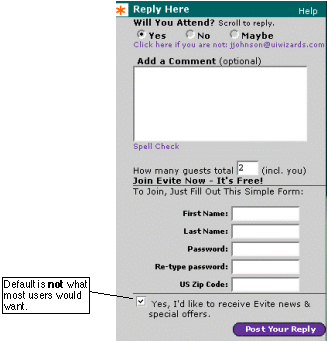Web Blooper of the Month
Evil Defaults
An important design principle for websites, web applications, and software in general is that choices in forms and control panels should have default values. The default values should be the most likely ones. This frees users from having to set everything explicitly. Instead, they can simply scan the settings, maybe change a few, and proceed.
A default value that is unlikely to be the one users want is potentially more harmful than no default. A user who overlooks a setting with no default often gets an error message, but overlooking a bad default usually yields an unwanted result.
Some defaults in website forms are more than bad, they are downright evil: intentionally set so visitors who fail to notice them will get something they probably don't want. For example, some sites ask new registrants if their data can be shared with other organizations, with the default set to "yes". Other sites ask whether they can send email announcements, defaulting to "yes".
JacksonAndPerkins.com
Note: The following describes JacksonAndPerkins.com as it was in 2002, when this article was posted. The JacksonAndPerkins site has been updated and improved since 2002.
An example of a "send me Spam" checkbox that is ON by default comes from flower vendor JacksonAndPerkins.com (see below). The option appears at the bottom of their registration form, where people can easily miss it.

Evite.com
Here's a default that is even more evil. Let's say a friend of yours uses Evite.com to send party invitations. The friend gives Evite the email addresses of invitees. Evite sends you a message with a link to their site for viewing and responding to the invitation. When you respond, you may or may not notice a checkbox at the bottom of the response form, labeled "Yes, I'd like to receive Evite news and special offers" (see below). It is checked unless you uncheck it.

This default amounts to "viral" marketing. People who aren't actual Evite customers, but who just received invitations, can be added to Evite's marketing list simply by overlooking a checkbox.
Defaults such as those at JacksonAndPerkins and Evite favor a website's company, rather than its users.
Avoiding the Blooper
Don't be evil. Set defaults so that they benefit your site's visitors, not your organization. Let people opt into having their information shared or receiving email announcements, as the American Cancer Society's website does (see below).